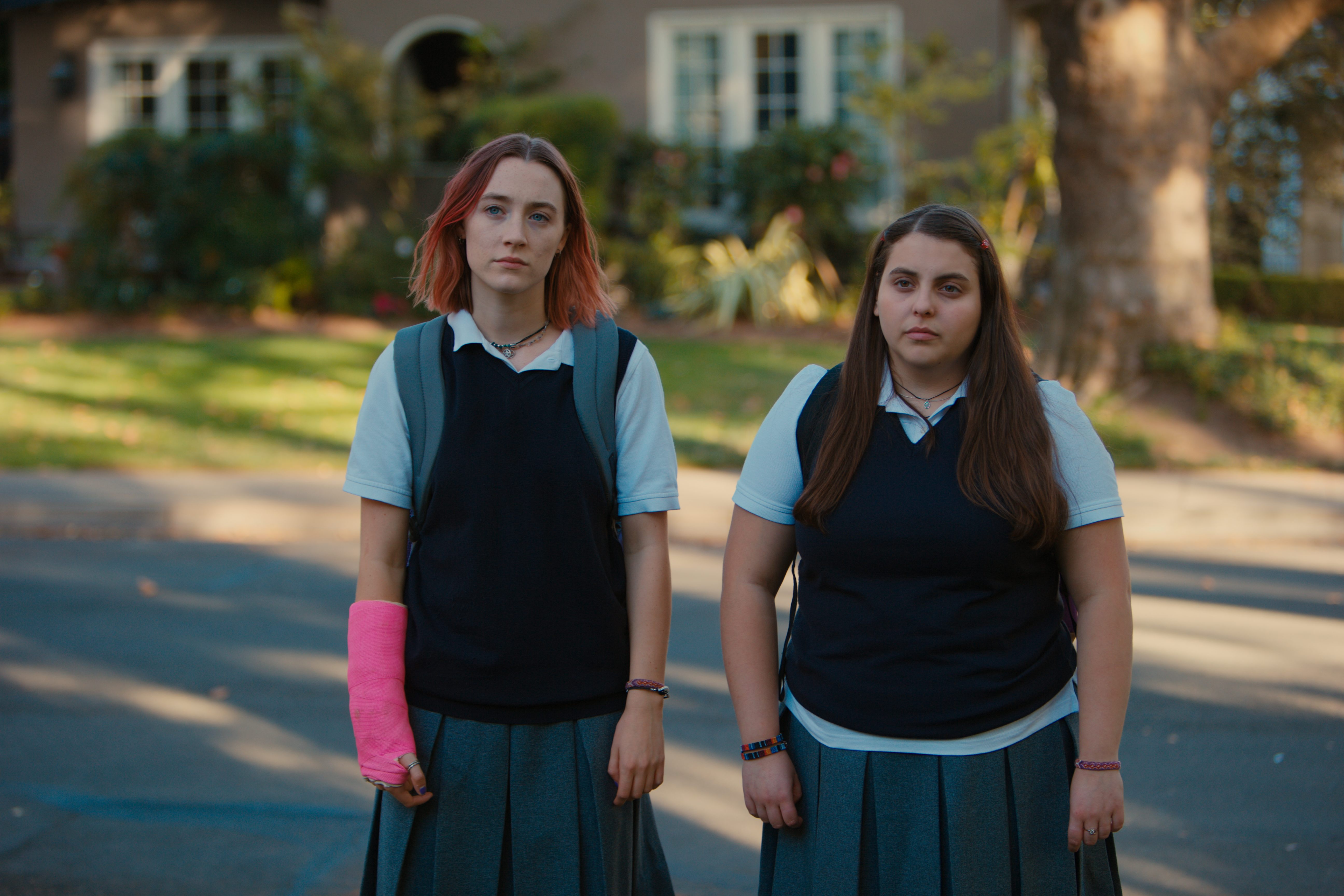Why Lady Bird is an instant-classic high school movie
Greta Gerwig's new film is going to be the next indie hit


A free daily email with the biggest news stories of the day – and the best features from TheWeek.com
You are now subscribed
Your newsletter sign-up was successful
It's a small thing, but it matters that when Christine "Lady Bird" McPherson gets her heart broken in writer-director Greta Gerwig's terrific new film Lady Bird, she finds comfort in the Dave Matthews Band's "Crash Into Me." Too often in modern teen comedies and dramas, characters are so hip that it strains credulity. They adopt their creators' tastes, and become, say, the only high schooler in 2015 Pittsburgh who loves Brian Eno and the Criterion Collection. But Lady Bird is set in 2002, so of course its 17-year-old heroine listens to Matthews and Alanis Morissette. Why should she be any different than any other American kid at the start of the new millennium?
If there's a reason why Lady Bird is poised to be one of this year's biggest indie film hits, it has a lot to do with how "right" so much of it feels. On the weekend of Nov. 3, playing in only four theaters, the film pulled in over $350,000 at the box office, giving Gerwig not just the highest per-screen average of any movie released in 2017, but also the highest ever for any directed by a woman. Clearly, this is a picture people have been waiting for.
Even back in September, when I tweeted enthusiastically about Lady Bird right after seeing it at the Toronto International Film Festival, that tweet was favorited and retweeted at a surprisingly prodigious rate for such a small project. Perhaps the Twitter community seized on my spontaneous Lady Bird love because I compared the movie to The Edge of Seventeen, a cult-favorite 2016 high school dramedy starring Hailee Steinfeld, who — like Kristen Stewart, Jennifer Lawrence, and countless other young actresses — has a posse of fans who patrol social media, looking to shout down haters and signal-boost praise. Or maybe Lady Bird's leading lady Saoirse Ronan has a similar army of devoted web-crawlers.
The Week
Escape your echo chamber. Get the facts behind the news, plus analysis from multiple perspectives.

Sign up for The Week's Free Newsletters
From our morning news briefing to a weekly Good News Newsletter, get the best of The Week delivered directly to your inbox.
From our morning news briefing to a weekly Good News Newsletter, get the best of The Week delivered directly to your inbox.
It seems unlikely that Twitter was uniting around Gerwig, although she certainly deserves her own mob. Although she just turned 34, Gerwig has been a major player in American independent cinema for over a decade, since emerging from the so-called "mumblecore" scene in the mid-2000s. Lady Bird is being touted as her directorial debut, but she actually co-wrote and co-directed the slim slice-of-life Nights and Weekends with Joe Swanberg in 2008, and showed some of the casual wit and incisive understanding of human nature she'd later bring to 2013's Frances Ha and 2015's Mistress America, two sparkling comedies she starred in and co-wrote with director Noah Baumbach.
The tone and subject matter of Lady Bird should be familiar to anyone who loved Frances Ha. Ronan plays Christine McPherson, a middle-class teen from Sacramento (just like Gerwig, and just like her Frances Ha character Frances Halladay) who's trying to reinvent herself in her senior year at a Catholic private high school before leaving home to go to college. She gives herself the nickname "Lady Bird," and has a series of romantic misadventures with much wealthier boys, including a theater geek (played by Lucas Hedges) who's suspiciously reluctant to get intimate with her, and a politically active alterna-kid (Timothée Chalemet) who's exactly the opposite.
So far in her career as a screenwriter — including with Lady Bird — Gerwig has worked in sketches and vignettes, assembling short scenes and interactions into something less like a "story" than a "life." There are multiple narrative threads in Lady Bird, followed in a scattered fashion. The movie bounces between the heroine's fumbling sexual explorations, her sometimes-strained relationship with her sweeter-natured best friend Julie (Beanie Feldstein), her seemingly quixotic quest to get into a college in New York City, and her epic fights with her mother Marion (Laurie Metcalf).
The mother-daughter arc gives the film some shape, and enough of a payoff that Lady Bird should keep playing well with multiplex audiences as it expands into more theaters. Metcalf — potentially an Oscar nominee for this role — plays Marion McPherson as an intensely money-conscious micro-manager, who's not the "Honey, you can do anything you set your mind to!" kind of mom. She criticizes her daughter's sloppiness, openly tells her she's not smart enough to go to a good school, and when Christine asks if she can buy a pricey fashion magazine at the grocery store to take home and read in bed, Marion scoffs, "That's for rich people."
A free daily email with the biggest news stories of the day – and the best features from TheWeek.com
The key to Lady Bird is that Marion is never painted as an ogre. Her toughness is played for comic effect: as an understandable character flaw born of her genuinely meaning well. She thinks she's preparing her child for the real world, so she hunkers down and shrugs off every eye-roll, every lame excuse, and every exasperated, "Moooomm!"
Meanwhile, Gerwig and Ronan paint Christine as selfish, short-sighted, and lacking in self-awareness ... again, in a way that's more comedic than critical. Christine is prone to pronouncements — like when she finally loses her virginity, and then states that she prefers "dry-humping" to actual sex — because she thinks she's figured out all she's ever going to need to know. Late in Lady Bird, Christine actually says, "I think we're done with the learning portion of high school." She's referring to classes, but it's still a dumb comment to make in a year where she's burned through boys and personas like they were clove cigarettes.
That's also exactly the kind of foggy point-of-view most 17-year-olds have. Lady Bird is an instant-classic high school movie in part because of the specificity of Gerwig's locations and action, exemplified by a scene where Christine and Julie compare the quality of their orgasms while snacking on communion wafers in the school chapel's supply room. But it's also significant that this self-styled "Lady Bird" is so stubbornly unexceptional, just as her mom keeps insisting. She's a mediocre student and kind of a crummy friend, with pretty pedestrian tastes in art and culture.
And yet Gerwig clearly adores this girl. And her mom. And even her dopey boyfriends. If there's one trait Gerwig shares with Marion McPherson it's that she loves her characters enough to be frank about what's wrong with them.
What sets Gerwig apart from her creations is a sense of perspective. She remembers why the Dave Matthews Band mattered. She recalls grueling shopping trips with hard-to-please mothers. She gets the general unease that began creeping through America in the year after 9/11. It's not just that Gerwig lived through all of this, but that she took such good mental notes, and is able to recreate that experience — in an entertaining, insightful way — both for viewers who were teens in the early '00s and those who weren't.
"I wish I could live through something," Christine idly mutters at one point. What makes this movie special is that Gerwig knows her "Lady Bird" actually has lived through something ... just as we all do.
Noel Murray is a freelance writer, living in Arkansas with his wife and two kids. He was one of the co-founders of the late, lamented movie/culture website The Dissolve, and his articles about film, TV, music, and comics currently appear regularly in The A.V. Club, Rolling Stone, Vulture, The Los Angeles Times, and The New York Times.
-
 The ‘ravenous’ demand for Cornish minerals
The ‘ravenous’ demand for Cornish mineralsUnder the Radar Growing need for critical minerals to power tech has intensified ‘appetite’ for lithium, which could be a ‘huge boon’ for local economy
-
 Why are election experts taking Trump’s midterm threats seriously?
Why are election experts taking Trump’s midterm threats seriously?IN THE SPOTLIGHT As the president muses about polling place deployments and a centralized electoral system aimed at one-party control, lawmakers are taking this administration at its word
-
 ‘Restaurateurs have become millionaires’
‘Restaurateurs have become millionaires’Instant Opinion Opinion, comment and editorials of the day
-
 Walter Isaacson's 'Elon Musk' can 'scarcely contain its subject'
Walter Isaacson's 'Elon Musk' can 'scarcely contain its subject'The latest biography on the elusive tech mogul is causing a stir among critics
-
 Welcome to the new TheWeek.com!
Welcome to the new TheWeek.com!The Explainer Please allow us to reintroduce ourselves
-
 The Oscars finale was a heartless disaster
The Oscars finale was a heartless disasterThe Explainer A calculated attempt at emotional manipulation goes very wrong
-
 Most awkward awards show ever?
Most awkward awards show ever?The Explainer The best, worst, and most shocking moments from a chaotic Golden Globes
-
 The possible silver lining to the Warner Bros. deal
The possible silver lining to the Warner Bros. dealThe Explainer Could what's terrible for theaters be good for creators?
-
 Jeffrey Wright is the new 'narrator voice'
Jeffrey Wright is the new 'narrator voice'The Explainer Move over, Sam Elliott and Morgan Freeman
-
 This week's literary events are the biggest award shows of 2020
This week's literary events are the biggest award shows of 2020feature So long, Oscar. Hello, Booker.
-
 What She Dies Tomorrow can teach us about our unshakable obsession with mortality
What She Dies Tomorrow can teach us about our unshakable obsession with mortalityThe Explainer This film isn't about the pandemic. But it can help viewers confront their fears about death.
